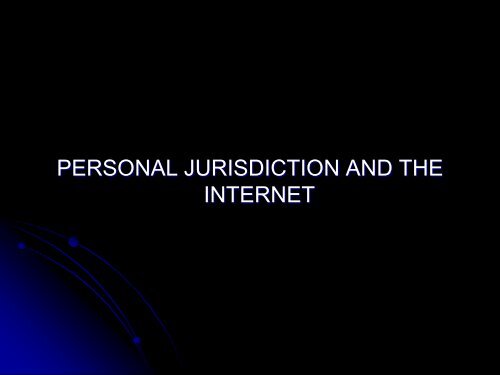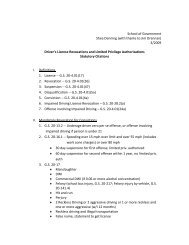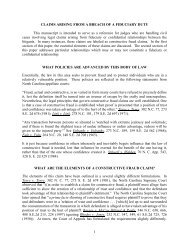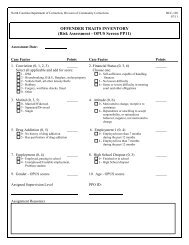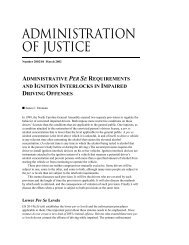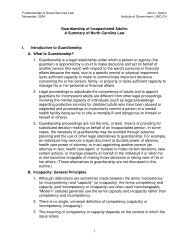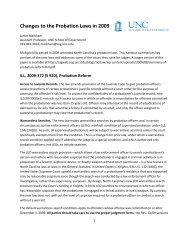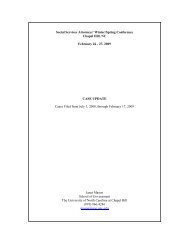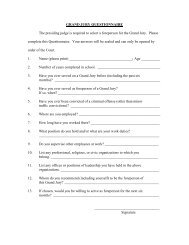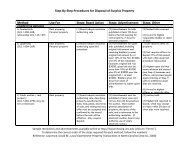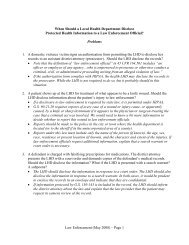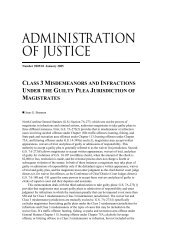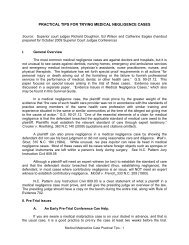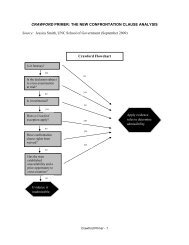Personal Jurisdiction and the Internet
Personal Jurisdiction and the Internet
Personal Jurisdiction and the Internet
You also want an ePaper? Increase the reach of your titles
YUMPU automatically turns print PDFs into web optimized ePapers that Google loves.
PERSONAL JURISDICTION AND THE<br />
INTERNET
General Background<br />
• NC Rule 12(b)(2) applies<br />
• May be raised (at pleader’s option) in preanswer<br />
motion or as part of responsive pleading<br />
• If not timely raised, <strong>the</strong>n waived.
General Background<br />
• Doing anything o<strong>the</strong>r than requesting an<br />
extension of time constitutes general<br />
appearance <strong>and</strong> waiver of personal jurisdiction<br />
defense. Judkins v. Judkins, 113 N.C. App. 734,<br />
441 S.E. 2d 139 (1994)<br />
• But once motion raised, D may make a general<br />
appearance <strong>and</strong> o<strong>the</strong>rwise defend on <strong>the</strong> merits.<br />
Lynch v. Lynch, 302 N.C. 189, 274 S.E.2d 212<br />
(1981)
Resolving Motion<br />
• Typically resolved on dueling affidavits w/o live testimony<br />
• Trial court’s findings binding on appeal if supported by<br />
competent evidence<br />
• Judge need not make findings of fact unless requested<br />
by a party; proper facts will be presumed on appeal if<br />
supported by <strong>the</strong> evidence<br />
• Although rare, judge can defer ruling on motion until trial<br />
(Rule 12(d)).
<strong>Personal</strong> <strong>Jurisdiction</strong> Focus<br />
• Has process been served properly?<br />
• May <strong>the</strong> Court assert jurisdiction<br />
consistent with <strong>the</strong> long-arm statute <strong>and</strong><br />
due process?<br />
• Who has <strong>the</strong> burden of proof?
<strong>Personal</strong> <strong>Jurisdiction</strong> Burden of Proof<br />
• Once raised by D, plaintiff has burden to<br />
establish jurisdiction. Brown v. Refuel America,<br />
Inc., ___ N.C. App. __, 652 S.E.2d 389 (2007).<br />
• If complaint alleges sufficient facts to establish<br />
jurisdiction, <strong>the</strong>y are deemed true even if<br />
unverified.<br />
• But if D files affidavit or o<strong>the</strong>r competent<br />
evidence rebutting allegations of jurisdiction, P<br />
must come forward with evidence.
<strong>Personal</strong> <strong>Jurisdiction</strong> (The St<strong>and</strong>ard)<br />
• Does transaction fall within reach of longarm<br />
statute? NCGS 1-75.4<br />
• If so, is exercise of jurisdiction consistent<br />
with due process (i.e. minimum contacts)?<br />
• Almost always collapses into a due<br />
process analysis.
Due Process <strong>and</strong> <strong>Internet</strong> Activity<br />
• The Issue: Just how much activity is<br />
enough?<br />
• Dailey v. Popma, 662 S.E.2d 12 (N.C.<br />
Ct. App. 2008)
Dailey v. Popma<br />
• D, Georgia resident, posted defamatory<br />
statements about P (NC resident) on internet<br />
bulletin board.<br />
• P committed embezzlement <strong>and</strong> <strong>the</strong>ft;<br />
• Is a cheat <strong>and</strong> a liar;<br />
• Is going to be wearing an orange jumpsuit;<br />
• Is a crook;<br />
• Is an a**hole;<br />
• Is a devious con man;<br />
• Is a scumbag; <strong>and</strong><br />
• Is <strong>the</strong> “equivalent” of a molester of boys
Dailey v. Popma<br />
• D moved to dismiss for lack of jurisdiction,<br />
claiming insufficient contacts with NC<br />
• Trial judge grants motion (but makes no<br />
findings)<br />
• Held: Affirmed
Dailey v. Popma<br />
• Complaint alleged D was “engaged in substantial<br />
activities” in NC, including a conspiracy w/ NC resident<br />
to defame P.<br />
• D filed affidavit, stating he had sold NC home in 2005,<br />
had not been present in NC since that time, <strong>and</strong> was not<br />
engaged in any activity in NC when served with<br />
complaint.<br />
• D did admit participating in BB discussions, but denied<br />
any discussions with co-defendant regarding <strong>Internet</strong><br />
postings.<br />
• P did not submit additional evidence.
Dailey v. Popma<br />
• COA Test: Whe<strong>the</strong>r D through his internet activities,<br />
manifested an intent to target <strong>and</strong> focus on North<br />
Carolina citizens<br />
• Not enough that some BB participants were North<br />
Carolinians.<br />
• Nor was it enough that D’s postings affected P in North<br />
Carolina.<br />
• Because P did not meet burden to show materials were<br />
posted with intent to direct content to NC, <strong>and</strong> presented<br />
no o<strong>the</strong>r evidence linking D to NC, dismissal was<br />
appropriate
Blumenthal v. Drudge, 992 F. Supp. 44<br />
(D. DC 1998).<br />
• Defamation case involving statements on<br />
a website published by Matt Drudge of<br />
The Drudge Report.<br />
• Claim was that Blumenthal (a high level<br />
Clinton official) regularly beat his wife.
Blumenthal v. Drudge<br />
• DC Court held it had jurisdiction over D (a<br />
California resident) based on <strong>the</strong> following:<br />
• Injury occurred in <strong>the</strong> District of Columbia;<br />
• D personally emailed his column to a list of DC email<br />
addresses;<br />
• D solicited contributions <strong>and</strong> collected money from<br />
DC Columbia residents;<br />
• Drudge traveled to DC twice to promote his column;<br />
<strong>and</strong><br />
• D.C. residents supplied D with fodder for his business<br />
-- news <strong>and</strong> gossip.
• Havey v. Valentine, 172 N.C. App. 812, 616 S.E.2d 642<br />
(2005).<br />
<strong>Personal</strong> <strong>Jurisdiction</strong> <strong>and</strong> <strong>Internet</strong> Commerce<br />
• <strong>Jurisdiction</strong> will turn on <strong>the</strong> interactive nature of <strong>the</strong><br />
commercial site.<br />
• Trial court should examine level of interactivity <strong>and</strong><br />
commercial nature of <strong>the</strong> exchange of information that<br />
occurs on <strong>the</strong> Web site.<br />
• But if D has no o<strong>the</strong>r connections to NC, <strong>the</strong> mere<br />
posting of an informational or “passive” website will likely<br />
be insufficient to confer jurisdiction.


